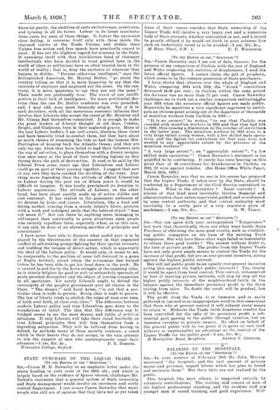[TO THE EDITOR OE THE " SPECTATOR."] SIR, —Canon Rawnsley says
I am out of date, because, for the purpose of my comparison of Carlisle with the rest of England and Wales respecting the statistics of drunkenness, I used the latest official figures. I cannot claim the gift of prophecy, which seems to be the common possession of State purchasers. I have shown that whereas over the whole of England and Wales, comparing 1914 with 1918, the "drunk" convictions decreased 84.50 per cent., in Carlisle within the same period the decrease was no more than 71 per cent. Canon Rawnsley challenges me to work out a similar comparison embracing4the year 1919 when the necessary official figures are made public.. Meanwhile he manifests a very significant eagerness to antici- pate an obvious point arising out of the departure of thousands of munition workers from Carlisle in 1919 :—
"It is no answer," he writes, "to say that Carlisle was crowded with munition workers in 1918 and that they had left in 1919, thus causing a diminution in the number of conviction} in the latter year. The munition workers in 1918 were to e. very large extent young women, with a few skilled male opera- tives, and the figures for convictions for that year were not swelled to any appreciable extent by the presence of the munition workers."
" A very large extent "; an " appreciable extent"; "a few skilled male operatives"! Canon Rawnaley's statement is too qualified to be convincing. It surely has some bearing on this point that of 80 convictions for drunkenness in Carlisle in 1918, 22 were against females. (See Home Office White Paper, March 26th, 1919.) Canon Rawnsley says that no one in his senses has proposed. that the Liquor Trade, if taken over by the State, should be conducted by a Department of the Civil Service centralized in London. What is the alternative ? Local controls ? A. scheme of that kind must inevitably involve financial and administrative chaos unless supervised, guided, and co-ordinated by some central authority, and that central authority must inevitably be a costly part of a very expensive piece of










































 Previous page
Previous page